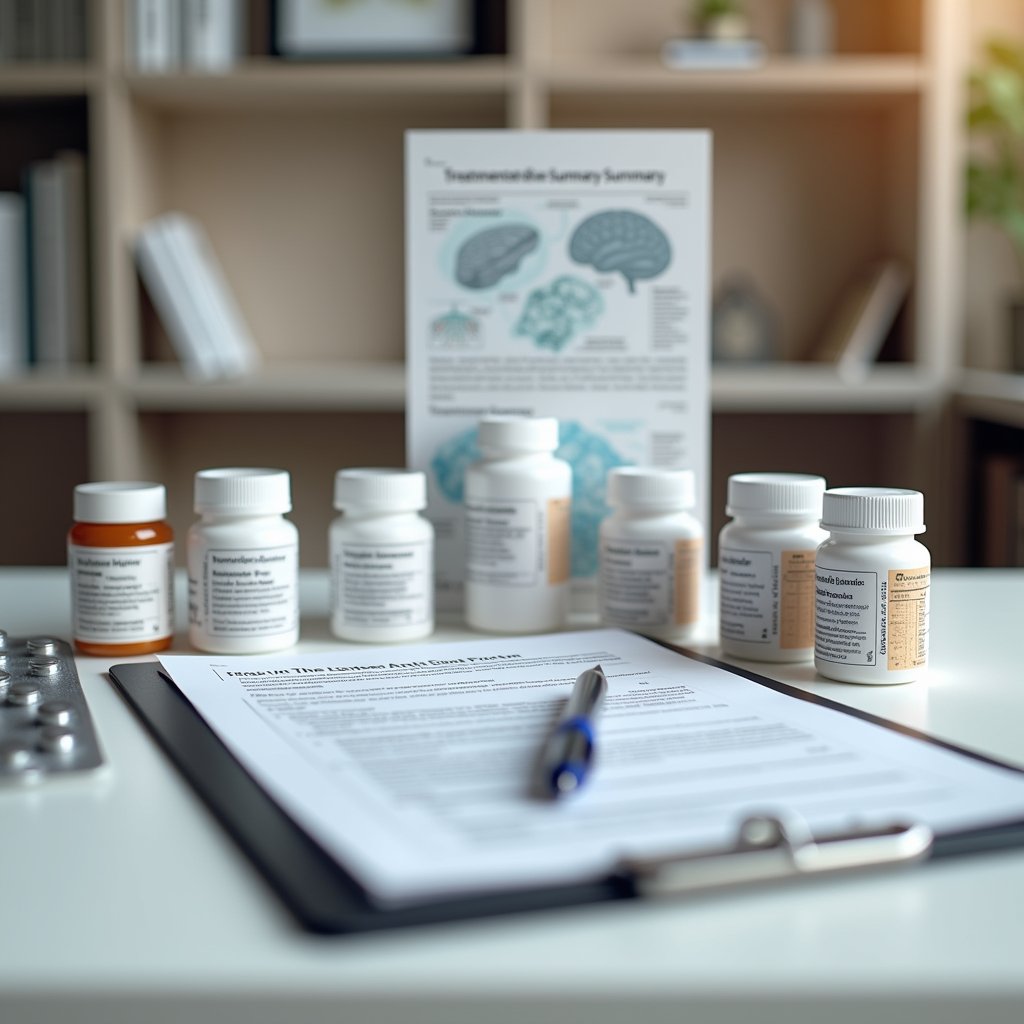Currently, you won’t find any FDA-approved medications specifically for treating cocaine addiction, though healthcare providers often prescribe diverse medications “off-label” to help manage symptoms. These may include anticonvulsants like topiramate, antidepressants such as bupropion, or dopamine modulating agents like modafinil. While these options can assist with cravings and withdrawal, they’re used as part of extensive treatment plans that typically combine behavioral therapy with medication management. Understanding the complete spectrum of available treatments can help inform your recovery decisions.
The Current FDA Approval Status for Cocaine Addiction Medications

Despite decades of research, the FDA hasn’t approved any medications specifically for treating cocaine addiction. While approved clinical trials have investigated various pharmacological approaches, no candidate has successfully met the FDA’s requirement of two successful Phase III trials. This gap in treatment options contrasts with existing approved medications for alcohol and opioid addictions.
Many studies investigating potential treatments have been hampered by methodological issues that affect data quality and reliability. Research continues to focus on new pharmacological targets, particularly within the glutamatergic and dopaminergic systems. Current treatment focuses on behavioral interventions like cognitive behavioral therapy and motivational interviewing. However, developing effective treatments faces significant challenges, including the complex nature of cocaine’s effects on the brain and high relapse rates among study participants. Clinical trials are further complicated by patient population variability and common comorbidities. Currently, healthcare providers often resort to off-label use of medications while awaiting FDA-approved options for cocaine addiction treatment. Some medications being studied, like disulfiram and modafinil, show potential promise in helping reduce cocaine use and cravings.
Common Off-Label Treatment Options in Clinical Practice

A range of medications serves as off-label treatment options for cocaine addiction in clinical practice. You’ll find anticonvulsants like divalproex and topiramate showing promise in reducing cocaine cravings, while dopamine-modulating agents such as modafinil and disulfiram target the brain’s reward pathways.
Efficacy data interpretation suggests antidepressants, particularly bupropion and desipramine, may help reduce cocaine-seeking behavior through norepinephrine modulation. Currently there are no FDA-approved medications specifically for treating cocaine use disorder.
Medication adherence challenges often influence treatment success, but GABA agonists like baclofen and beta-blockers such as propranolol offer additional therapeutic choices. The experimental TA-CD vaccine represents a novel approach to cocaine metabolism intervention.
When combined with psychosocial therapies, these medications demonstrate varying degrees of effectiveness in managing cocaine dependence, though more research is needed to establish definitive treatment protocols.
Why No Medications Have Received FDA Approval Yet

Understanding why no medications have achieved FDA approval for cocaine addiction requires examining multiple regulatory and scientific challenges. The lack of consistent neurobiological targets makes it difficult to develop standardized treatments, as cocaine affects multiple neurotransmitter systems simultaneously. The variable clinical presentation among patients further complicates treatment efficacy assessment, with withdrawal symptoms differing vastly across individuals.
The absence of reliable biomarkers to measure treatment response poses noteworthy challenges for researchers. The FDA’s stringent requirements for large-scale, multi-site randomized controlled trials are particularly challenging for cocaine addiction studies, where polydrug use often confounds results and safety concerns must be carefully balanced against potential benefits.
Current clinical trials face substantial hurdles, including high dropout rates and difficulties in patient retention. Greatly, the absence of reliable biomarkers to measure treatment response poses noteworthy challenges for researchers.
Alternative Treatment Approaches During Medication Development
While medications for cocaine addiction continue undergoing development, several evidence-based alternative treatments have demonstrated promising results in managing substance use disorder. You’ll find evidence-based psychosocial interventions like cognitive behavioral therapy, which reduces cocaine use days and improves abstinence rates by up to 19%. Contingency management and motivational interviewing bolster treatment retention and reduce relapse risk. Inpatient rehabilitation programs offer structured environments away from triggers during the critical early recovery phase.
Complementary healing modalities offer additional support. Mindfulness-based relapse prevention helps manage cravings, while yoga and exercise programs correlate with improved mental health outcomes. You can access these treatments through diverse platforms, including telehealth services for rural areas and intensive outpatient programs that combine therapy with daily life. Community-based support systems, including peer recovery specialists and sober living homes, provide indispensable ongoing support during recovery.
Research Progress Toward Future FDA-Approved Solutions
Three decades of research have revealed promising candidates for FDA-approved cocaine addiction medications, despite the current absence of approved treatments. Scientists are making progress through biomarker-guided therapy trials, which match patients to treatments based on their genetic and neurochemical profiles.
Recent Phase II trials with 68 participants have demonstrated mavoglurant‘s effectiveness in reducing cocaine use compared to placebo. You’ll find researchers exploring combination pharmacotherapy strategies, including the recent testing of mavoglurant and the potential pairing of avutometinib with defactinib.
The path to FDA approval requires overcoming significant challenges, including the need for two large-scale trials demonstrating efficacy. While medications like tiagabine, baclofen, and modafinil show promise in early studies, researchers are increasingly focusing on drug repurposing and public-private partnerships to accelerate development.
These approaches, combined with personalized treatment strategies, may ultimately lead to the first FDA-approved cocaine addiction medication.
Frequently Asked Questions
Can Insurance Cover Off-Label Medications Prescribed for Cocaine Addiction Treatment?
Yes, you can get insurance coverage for off-label medications prescribed for cocaine addiction, but you’ll face medication coverage limitations. Your insurance provider will typically require documentation of medical necessity and prior authorization.
Regulatory approval process barriers mean you’ll need your healthcare provider to demonstrate treatment efficacy through clinical evidence. Coverage depends on your specific policy terms, and you may encounter higher copays or strict requirements for continued authorization.
How Long Does Cocaine Addiction Medication Development Typically Take From Research to Approval?
You’ll find that cocaine addiction medication development typically takes 10-15 years from initial research to FDA approval. The medication development process includes a 2-3 year preclinical phase, followed by three clinical trial phases lasting 6-10 years combined.
The final FDA review adds another 1-2 years. Clinical trial duration is particularly lengthy for cocaine medications due to complex safety requirements, need for multiple pivotal trials, and challenges in measuring treatment outcomes.
Are There Specific Genetic Markers That Determine Medication Effectiveness for Cocaine Addiction?
Currently, there aren’t any established genetic markers definitively linked to cocaine addiction medication effectiveness.
While researchers are studying pharmacogenomic factors and biological pathways that might influence treatment response, scientific evidence hasn’t identified reliable predictors. You’ll find that individual responses to potential treatments differ enormously.
Research continues to investigate genetic variations that could impact drug metabolism and neurotransmitter systems, but conclusive markers remain undiscovered.
What Role Do International Clinical Trials Play in FDA Approval Decisions?
International clinical trials play a pivotal role in FDA approval decisions through multi-site clinical collaborations that generate diverse data sets. You’ll find that when trials meet international regulatory guidelines and Good Clinical Practice standards, the FDA accepts their findings as part of the approval process.
These global studies help you understand drug efficacy across different populations and can accelerate development timelines, though they must still demonstrate effectiveness in U.S. populations.
How Do Cocaine Addiction Medications Interact With Other Commonly Prescribed Psychiatric Drugs?
When you’re taking medications for cocaine addiction, you’ll need to watch for potential drug interactions with psychiatric medicines. You’ll want your doctor to carefully monitor combinations with benzodiazepines and SSRIs, as these can increase sedation or serotonin syndrome risk.
Medication dosage adjustments are often necessary, especially with baclofen and modafinil. You should be particularly cautious with CNS depressants, as they can cause excessive drowsiness or respiratory concerns when combined with addiction treatments.






